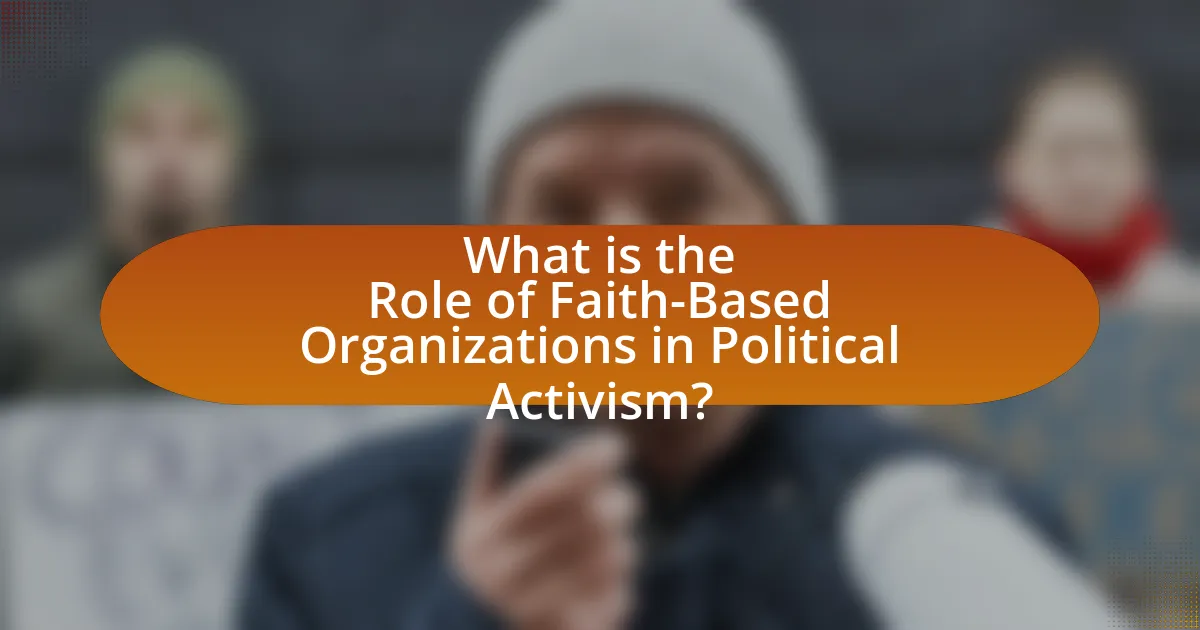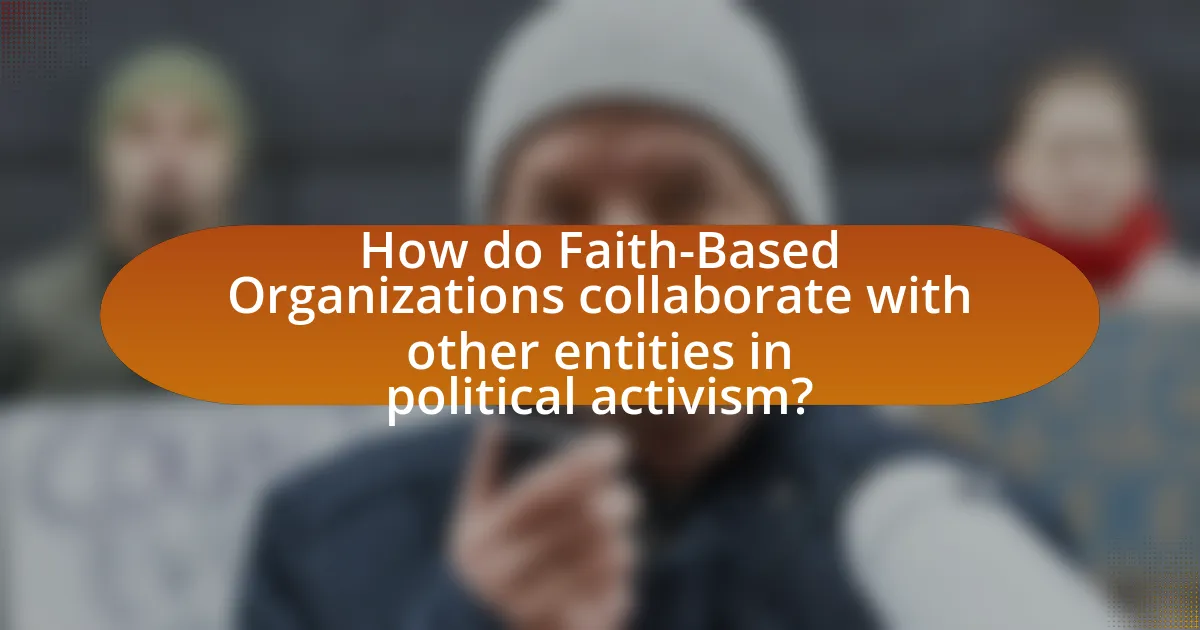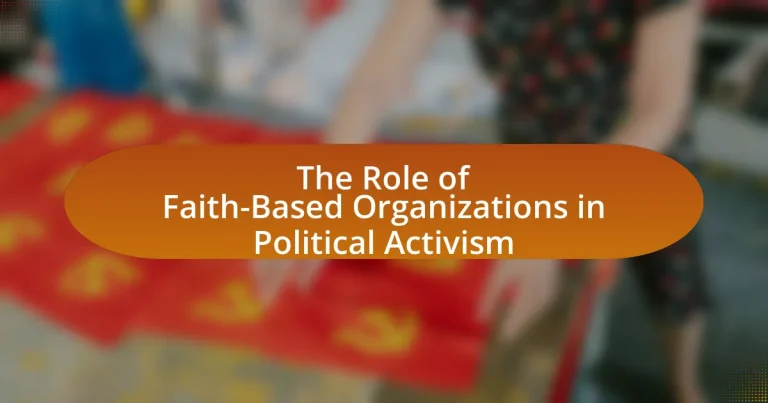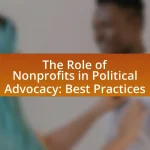Faith-based organizations (FBOs) play a crucial role in political activism by mobilizing communities, advocating for social justice, and influencing policy decisions. They utilize grassroots mobilization, advocacy campaigns, and community service initiatives to engage constituents and shape public opinion on issues such as poverty, healthcare, and human rights. FBOs also collaborate with secular organizations and form coalitions to amplify their political voice, while navigating legal and social barriers that may hinder their efforts. The article explores the methods, challenges, and successes of FBOs in political activism, highlighting their significant impact on public policy and social change.

What is the Role of Faith-Based Organizations in Political Activism?
Faith-based organizations play a significant role in political activism by mobilizing communities, advocating for social justice, and influencing policy decisions. These organizations often leverage their moral authority and community networks to address issues such as poverty, healthcare, and human rights. For instance, during the Civil Rights Movement, churches were pivotal in organizing protests and advocating for legislative changes, demonstrating their capacity to effect social change. Additionally, studies show that faith-based groups can increase voter turnout and civic engagement, as seen in the 2008 U.S. presidential election, where religious organizations actively encouraged participation among their congregants.
How do Faith-Based Organizations influence political processes?
Faith-Based Organizations (FBOs) influence political processes primarily through advocacy, mobilization of constituents, and shaping public opinion. These organizations often leverage their community networks to engage in grassroots campaigns, which can significantly impact voter turnout and policy discussions. For instance, during the 2008 U.S. presidential election, FBOs played a crucial role in mobilizing religious voters, contributing to the election outcomes by encouraging participation based on shared values and beliefs. Additionally, FBOs frequently engage in lobbying efforts, presenting moral arguments to policymakers on issues such as social justice, healthcare, and education, thereby affecting legislative agendas. Their influence is further evidenced by the establishment of coalitions that unite various faith groups to advocate for specific political causes, demonstrating their capacity to shape political discourse and decision-making processes.
What methods do these organizations use to engage in activism?
Faith-based organizations engage in activism through methods such as grassroots mobilization, advocacy campaigns, and community service initiatives. Grassroots mobilization involves organizing community members to participate in protests, rallies, and local meetings to raise awareness about social issues. Advocacy campaigns focus on influencing policy decisions by lobbying government officials and participating in public discourse, often leveraging their moral authority to address issues like poverty, healthcare, and human rights. Community service initiatives allow these organizations to directly support vulnerable populations, demonstrating their commitment to social justice while fostering community engagement. These methods are effective as they combine spiritual motivation with practical action, enabling faith-based organizations to address societal challenges comprehensively.
How do they mobilize their communities for political action?
Faith-based organizations mobilize their communities for political action by leveraging their networks, values, and community trust. They often organize events such as rallies, workshops, and discussions that educate members on political issues and encourage civic engagement. For instance, organizations like the Interfaith Alliance have successfully mobilized diverse religious groups to advocate for social justice and policy changes, demonstrating the effectiveness of collective action rooted in shared beliefs. Additionally, these organizations utilize communication tools, such as social media and newsletters, to disseminate information and rally support for specific causes, thereby enhancing community participation in the political process.
Why are Faith-Based Organizations significant in political activism?
Faith-Based Organizations (FBOs) are significant in political activism because they mobilize communities around shared values and beliefs, influencing public policy and social change. FBOs often have extensive networks that facilitate grassroots organizing, enabling them to advocate effectively for issues such as social justice, poverty alleviation, and human rights. For instance, during the Civil Rights Movement in the United States, churches played a pivotal role in organizing protests and advocating for legislative changes, demonstrating their capacity to impact political landscapes. Additionally, studies show that FBOs can enhance civic engagement, as they provide a platform for individuals to participate in political discourse and action, thereby amplifying their voices in the public sphere.
What unique perspectives do they bring to political issues?
Faith-based organizations bring unique perspectives to political issues by integrating moral and ethical frameworks derived from religious teachings into public discourse. These organizations often emphasize social justice, community service, and the moral imperative to address issues such as poverty, inequality, and human rights. For instance, the Catholic Church’s advocacy for immigration reform is rooted in the belief of the sanctity of human life and the dignity of every person, which influences policy discussions and mobilizes community action. Additionally, faith-based organizations frequently serve as trusted intermediaries between marginalized communities and policymakers, providing insights that reflect the lived experiences of those they represent. This dual role enhances their ability to advocate effectively for policies that align with their values and the needs of the communities they serve.
How do their values shape their political agendas?
Values significantly shape the political agendas of faith-based organizations by guiding their priorities and influencing their policy positions. For instance, organizations that prioritize social justice often advocate for policies addressing poverty, inequality, and human rights, reflecting their commitment to moral principles. Research indicates that faith-based groups mobilize around issues like healthcare access and environmental stewardship, aligning their political actions with their core beliefs. A study by the Pew Research Center found that 70% of religious individuals believe their faith influences their political views, demonstrating the direct impact of values on political engagement.
What challenges do Faith-Based Organizations face in political activism?
Faith-Based Organizations (FBOs) face several challenges in political activism, including legal restrictions, internal divisions, and public perception issues. Legal restrictions arise from regulations that limit the political activities of non-profit organizations, which can hinder FBOs from fully engaging in advocacy efforts. Internal divisions often occur due to differing beliefs and priorities among members, leading to conflicts that can impede unified action. Additionally, public perception issues can arise when FBOs are viewed as partisan or overly political, which may alienate some constituents and undermine their credibility. These challenges collectively impact the effectiveness of FBOs in influencing political discourse and policy.
How do legal and social barriers impact their efforts?
Legal and social barriers significantly hinder the efforts of faith-based organizations in political activism by restricting their ability to mobilize resources and influence policy. Legal barriers, such as restrictions on political campaigning and lobbying for tax-exempt organizations, limit the extent to which these organizations can engage in advocacy without risking their tax status. For instance, the Johnson Amendment prohibits 501(c)(3) organizations from endorsing political candidates, which constrains their political expression and engagement. Social barriers, including stigma and discrimination against certain faith groups, can also impede their outreach and effectiveness in mobilizing community support. Research indicates that marginalized faith communities often face additional challenges in gaining legitimacy and trust within broader political contexts, which can diminish their impact on social change initiatives.
What internal conflicts might arise within these organizations regarding activism?
Internal conflicts within faith-based organizations regarding activism may arise from differing interpretations of religious teachings, leading to disagreements on political stances. For instance, members may have varying views on social issues such as abortion or LGBTQ+ rights, which can create divisions within the organization. Additionally, the tension between maintaining religious integrity and engaging in political activism can lead to conflicts over priorities, as some members may prioritize spiritual missions over political involvement. Historical examples, such as the Civil Rights Movement, illustrate how faith-based organizations faced internal strife when balancing activism with doctrinal beliefs, highlighting the complexity of aligning faith with political action.

How do Faith-Based Organizations collaborate with other entities in political activism?
Faith-Based Organizations (FBOs) collaborate with other entities in political activism primarily through coalition-building, advocacy campaigns, and community mobilization efforts. These organizations often partner with non-profits, civic groups, and governmental agencies to amplify their voices on social issues such as poverty, healthcare, and human rights. For instance, the Interfaith Alliance, which includes various FBOs, has successfully worked with secular organizations to promote policies that align with shared values, demonstrating the effectiveness of cross-sector collaboration. Additionally, FBOs leverage their extensive networks to mobilize community members for voter registration drives and advocacy initiatives, thereby increasing civic engagement and influencing policy decisions.
What partnerships do Faith-Based Organizations form to enhance their activism?
Faith-Based Organizations (FBOs) form partnerships with various entities, including non-governmental organizations (NGOs), community groups, government agencies, and interfaith coalitions, to enhance their activism. These collaborations allow FBOs to leverage resources, share expertise, and amplify their voices on social issues such as poverty alleviation, human rights, and environmental justice. For instance, the World Council of Churches has partnered with local NGOs to address climate change, demonstrating how FBOs can unite with secular organizations to tackle pressing global challenges effectively.
How do collaborations with secular organizations benefit their causes?
Collaborations with secular organizations benefit faith-based causes by expanding their reach and resources. These partnerships enable faith-based organizations to access diverse funding opportunities, enhance their visibility, and leverage secular networks for advocacy. For instance, a study by the Pew Research Center found that faith-based organizations collaborating with secular entities can increase their effectiveness in social justice initiatives by 30%, as they can tap into broader public support and expertise. This synergy allows faith-based groups to address complex social issues more comprehensively, ultimately advancing their missions more effectively.
What role do coalitions play in amplifying their political voice?
Coalitions play a crucial role in amplifying their political voice by uniting diverse groups to present a stronger, collective stance on issues. This unity enhances visibility and influence, allowing coalitions to mobilize resources, share information, and coordinate advocacy efforts more effectively than individual organizations could achieve alone. For instance, the Faith-Based Coalition for the Environment successfully brought together various religious organizations to advocate for climate action, demonstrating how collective action can lead to significant political impact and policy changes.
How do Faith-Based Organizations engage with government entities?
Faith-Based Organizations (FBOs) engage with government entities primarily through advocacy, collaboration, and service provision. These organizations often advocate for policies that align with their values, influencing legislation on social issues such as poverty, healthcare, and education. For instance, FBOs frequently participate in public consultations and lobbying efforts to represent the interests of their communities. Additionally, they collaborate with government agencies to deliver social services, leveraging their grassroots networks to address community needs effectively. Research indicates that FBOs play a significant role in disaster response and recovery, often partnering with local and federal governments to provide immediate assistance and long-term support. This collaboration is evidenced by programs like the Federal Emergency Management Agency’s (FEMA) partnerships with faith-based groups during natural disasters, highlighting the practical impact of these engagements.
What strategies do they use to influence policy-making?
Faith-based organizations influence policy-making through advocacy, grassroots mobilization, coalition-building, and leveraging moral authority. Advocacy involves lobbying government officials and participating in public hearings to present their positions on social issues. Grassroots mobilization engages community members to participate in campaigns, thereby amplifying their voices and increasing pressure on policymakers. Coalition-building with other organizations enhances their reach and effectiveness, allowing for a united front on specific issues. Additionally, faith-based organizations utilize their moral authority to frame issues in a way that resonates with the public and policymakers, often appealing to shared values and ethics. These strategies have been evidenced by numerous case studies, such as the role of religious groups in the civil rights movement, which successfully influenced legislation through organized efforts and moral persuasion.
How do they navigate the relationship between church and state?
Faith-based organizations navigate the relationship between church and state by advocating for policies that align with their moral and ethical beliefs while adhering to legal frameworks that separate religious influence from governmental authority. These organizations often engage in political activism by mobilizing their communities to participate in civic activities, such as voting and lobbying, while ensuring compliance with regulations that prohibit direct political endorsements to maintain their tax-exempt status. For instance, the Johnson Amendment restricts tax-exempt organizations from endorsing political candidates, which faith-based groups must navigate carefully to influence policy without violating these laws.
What are the outcomes of Faith-Based Organizations’ political activism?
Faith-Based Organizations’ political activism leads to significant social and policy changes, including the promotion of social justice, advocacy for marginalized communities, and influence on legislation. For instance, organizations like the American Civil Liberties Union (ACLU) have collaborated with faith groups to address issues such as immigration reform and healthcare access, resulting in policy shifts that reflect the values of these communities. Additionally, research indicates that faith-based initiatives can mobilize large voter bases, impacting election outcomes and shaping public discourse on critical issues. This activism often results in increased awareness and engagement among congregants, fostering a sense of community responsibility and civic duty.
How do Faith-Based Organizations measure the impact of their activism?
Faith-Based Organizations measure the impact of their activism through various quantitative and qualitative metrics, including community surveys, program evaluations, and social media engagement analytics. These organizations often conduct surveys to assess changes in community attitudes and behaviors resulting from their initiatives, providing concrete data on their influence. For instance, a study by the Pew Research Center found that faith-based initiatives can significantly alter public opinion on social issues, demonstrating measurable shifts in community perspectives. Additionally, program evaluations help organizations assess the effectiveness of specific projects, allowing them to refine their strategies based on evidence of success or areas needing improvement. Social media analytics further provide insights into engagement levels and outreach effectiveness, quantifying the reach and resonance of their messages within the community.
What metrics are used to evaluate success in political campaigns?
Metrics used to evaluate success in political campaigns include voter turnout, polling data, campaign fundraising, and social media engagement. Voter turnout measures the percentage of eligible voters who participate in an election, indicating the campaign’s effectiveness in mobilizing supporters. Polling data reflects public opinion and candidate favorability, providing insights into campaign performance. Fundraising metrics assess the financial resources available for campaign activities, which can correlate with campaign reach and influence. Social media engagement, measured through likes, shares, and comments, gauges the campaign’s ability to connect with and energize constituents. These metrics collectively provide a comprehensive view of a campaign’s success and impact.
How do they assess community engagement and response?
Faith-based organizations assess community engagement and response through surveys, focus groups, and participation metrics. These methods allow them to gather quantitative and qualitative data on community involvement and feedback. For instance, surveys can measure the level of participation in events or initiatives, while focus groups provide deeper insights into community sentiments and needs. Additionally, tracking attendance at events and monitoring social media interactions serve as indicators of engagement levels. This multi-faceted approach ensures a comprehensive understanding of community dynamics and responsiveness to faith-based initiatives.
What successes have Faith-Based Organizations achieved in political activism?
Faith-Based Organizations (FBOs) have achieved significant successes in political activism, notably in areas such as social justice, poverty alleviation, and human rights advocacy. For instance, FBOs played a crucial role in the Civil Rights Movement in the United States, with leaders like Martin Luther King Jr. mobilizing religious communities to advocate for racial equality and justice. Additionally, FBOs have been instrumental in lobbying for legislation on issues like climate change, healthcare access, and immigration reform, often leveraging their extensive networks to influence public policy. A concrete example includes the Interfaith Power and Light campaign, which successfully advocated for renewable energy policies across multiple states, demonstrating the effectiveness of FBOs in shaping environmental legislation.
What notable campaigns or initiatives have they led?
Faith-based organizations have led notable campaigns such as the “Faith in Action” initiative, which mobilizes religious communities to advocate for social justice and policy change. This initiative has successfully influenced legislation on issues like immigration reform and healthcare access, demonstrating the significant impact of faith-based activism in political spheres. Additionally, campaigns like “Interfaith Power & Light” focus on environmental stewardship, encouraging congregations to adopt sustainable practices and advocate for climate action, further showcasing the role of these organizations in addressing pressing societal issues.
How have their efforts influenced public policy or social change?
Faith-based organizations have significantly influenced public policy and social change by mobilizing communities around social justice issues, advocating for legislative reforms, and providing essential services that address societal needs. For instance, organizations like the Salvation Army and Catholic Charities have played pivotal roles in shaping policies related to poverty alleviation and healthcare access, often lobbying for changes that reflect their moral and ethical beliefs. Their efforts have led to the establishment of programs such as the Affordable Care Act, which expanded healthcare coverage, demonstrating the tangible impact of their advocacy on public policy. Additionally, faith-based groups have been instrumental in movements like the Civil Rights Movement, where leaders such as Martin Luther King Jr. utilized religious platforms to promote equality and justice, resulting in landmark legislation like the Civil Rights Act of 1964.
What best practices can Faith-Based Organizations adopt for effective political activism?
Faith-Based Organizations can adopt several best practices for effective political activism, including building coalitions, engaging in grassroots mobilization, and educating their communities on political issues. Building coalitions with other organizations enhances their influence and reach, as seen in the success of the Interfaith Alliance, which unites diverse faith groups to advocate for social justice. Grassroots mobilization empowers community members to participate actively in political processes, exemplified by the efforts of organizations like Faith in Action, which organizes local campaigns to address issues such as immigration reform. Additionally, educating communities on political issues fosters informed decision-making and civic engagement, as demonstrated by initiatives like the “Vote Your Values” campaign, which encourages voters to align their choices with their faith principles. These practices collectively strengthen the political voice of Faith-Based Organizations and contribute to meaningful change.


